- Home
- Jim Fergus
Strongheart: The Lost Journals of May Dodd and Molly McGill Page 14
Strongheart: The Lost Journals of May Dodd and Molly McGill Read online
Page 14
May laughed again. In spite of it all, she seemed to have maintained a pointedly ironic sense of humor that fully appreciated the otherworldliness of our lives. “Well, of course it has, from the very first time we laid eyes upon our future husbands and our new lodging among their people. It occurs to me still. I believe it is why the Indian and white worlds have never successfully intermingled, have never come to terms with each other, and probably never will. It is why the whites exterminate the Indians, or lock them up on reservations, because they fear the sheer otherness of them; they’re terrified of a people who aren’t like them, and whom they are incapable of understanding … and they make pitifully little effort to do so.”
“Yet there is much to be afraid of in both worlds, isn’t there?” I said. “And from both peoples.”
“Indeed, and as you must also know well by now, we are directly in the middle of them, aren’t we? Speaking of that, it is true then that Seminole took Martha captive?”
“I’m afraid so. But how did you know?”
“Because we, too, encountered the lunatic in our travels here, more than once. Of that I will tell you later. Good God … my head is spinning … or maybe it’s from the tobacco to which I am not accustomed. I must stand and walk a moment. I’ve been too long in the saddle, and I’m beginning to feel like a centaur. Please come walk with me, Molly.”
We walked down to the creek and then along the bank, in silence for a long while. The sun had risen, taking fast the morning chill from the air. Insects were hatching in clouds over the water, bringing the trout up to feed on the surface, the pools pockmarked by their rises. Swallows worked the hatch, too, skimming the water, the tips of their wings leaving delicate wakes behind as they snatched up their prey. The prairie birds had taken up their full morning songs.
“Isn’t it odd, too,” May said, “how sometimes this country can seem like paradise on earth, and other times like hell? I can’t stop thinking about Martha being captured by Jules Seminole.”
“I had my own moment in his company,” I said, “but I escaped more or less unscathed. Truly, he is a lunatic, and I’m afraid that poor Martha got the very worst of it.”
“Of all our group, she was the least prepared for such an ordeal.”
“That is exactly what Susie and Meggie said. But she’s strong now. You will hardly recognize her.”
“I’m so glad to know that those Irish scamps survived the attack. Are they here with you now?”
I had to tell May then about the fate of the Kelly twins. When I finished she fell silent and pensive again.
“You know, Molly,” she said finally, “when first we came out here on the train, we all had to watch our purses and other personal effects, for those girls were incorrigibly light-fingered. Take your eyes off them for a minute, and suddenly you’d see that one of them was wearing your brooch. They always said they had no interest in being mothers, and had just signed up for the brides program to avoid prison. They intended to do their two years here, have their babies, leave them with the Cheyenne, and go right back to their life of crime in Chicago. But, of course, they loved those tiny infants as much as all mothers love theirs. I understand their rage against the soldiers … I share it. To hear you tell of their exploits, they became true warriors in their own right, avenging the murder of their children. And I can imagine how they must have terrorized the soldiers. Good for them. I would like to have done so, myself.”
“I, too, got off to a rocky start with Susie and Meggie,” I said, “but we became quite close after a time. They spoke often of you; they called you a fancy, educated girl. Yet you were a kind of model to them. They loved and respected you, and said you were the glue that held them all together … I probably shouldn’t tell you this, May … but they also said you were a bit of a tart.”
At this, a shadow of great sadness descended over May’s face and I immediately regretted having spoken thus.
“I am so deeply sorry, May,” I said. “I did not mean to hurt you. I assumed you knew this as the twins always said you teased each other about such matters.
“It’s alright, Molly, it’s not your fault,” she answered. “I did know, and the girls were right, we never stopped teasing each other about who was the most promiscuous among us. It’s just that more recently the fact of my being a bit of a tart has come back to haunt me. I’m sure they told you of my short … and deeply inappropriate tryst with Captain John Bourke, which they never let me forget. For my part, I took great pleasure in reminding them of their career in Chicago as ladies of the night.”
“After everyone thought you were dead, the Kellys tried to assume your role as leaders,” I said. “You were a tough act to follow, but they did their best, and were of great aid to us after we were captured by the Lakota. They made us laugh with their irreverent antics and Irish cheekiness. I think if we had only found you back at the cave that day, and you had been reunited with them, their story might have had a very different ending … they might still be here with us…”
“I’ve been thinking the same thing,” May said, “and it breaks my heart … I miss them so … those damn foolish girls … and all the others…” May started crying now. “So many gone, Molly…”
I felt it might help May if we rode over to our main group so that she could see her old friend Martha, as well as meet the others in our group, and when I suggested it she was thrilled. Although she appears so outwardly strong and quick to laugh, at the same time it was impossible for me not to notice in her a deep weariness … a fragility. I thought that being reunited with at least two of her old friends would do her good. I did not tell her that Phemie was also among us, as I wanted to save that for a surprise.
Wind and Hawk seemed to have a great deal to discuss, and back at the fire they were still in deep conference. It was agreed that May and I would rejoin the main group, and the two of them would join us in a day or two with the pack horses, and those Wind and May had brought as gifts.
As I saddled Spring and gathered my few effects, I felt a great sense of wistfulness that the time spent alone on our first real honeymoon had come to an end. And I know Hawk did as well. It is true that the communal life of nomadic peoples allows far less privacy to the individual or couples, and clearly our overactive erotic life was going to be greatly curtailed. There would be no more crying out loud in the ecstasy of climax, perhaps only soft moans muffled by burying my face in the thick curly hair of the buffalo blanket. Hawk and I looked deep in each other’s eyes before I mounted, and, without speaking, shared this mutual regret.
We rode out. The main band was camped across the broad valley, on the banks of another creek, which would only take us a bit over an hour or so to reach. May and I had in this short time already formed a comfortable bond between us. In her presence, I was more aware than ever of how much I missed Carolyn, Ann, Hannah, Meggie, and Susie, our closeness and daily banter, our sense that we were all in this together. And I well understood May’s heartbreak for having lost so many of her friends, and all so violently.
“You seem to have adapted well to this life, Molly,” she said.
“As you certainly know better than I, May, one adapts here or perishes. That became our group’s motto. Of course, too frequently one adapts and perishes.”
“I see how much in love you and Hawk are. I’m so glad you found each other. I know from Wind what happened to his family. That was such a horrifying day…”
“And I am so deeply sorry for you, and for all you have suffered. That short time we spent camped near your burned-out village was unsettling … to say the least. Especially at night and in the disturbing dreams we all shared, we had the sense that we were haunted by the presence of the unsettled spirits of the dead.”
“Yes, believe me, I, too, felt those spirits, and had those same dreams in our cave, both sleeping and awake for forty-eight days and nights … and surely even more vividly than you for having lived through it.”
“Yes, of course,” I said. “I
’m sorry, May, I seem to be so clumsy speaking to you about these things. I did not mean to suggest otherwise.”
“Of course you didn’t, Molly,” she said. “Nor did I take offense. I’m sure Susie and Meggie told you of this, but after the battle, or, I should say, the massacre that morning was over, the soldiers built a giant funeral pyre of all our possessions and upon it placed the bodies of our dead. Where we huddled for warmth in the hills, the odor of burning flesh wafted in the air, sickening us, a stench I shall never be able to rid from my nostrils. I could never bring myself to go back down to the village. Even had I the strength to help Wind and her sister build the burial platforms of which you spoke, and collect the charred remains of our people to place upon them, I would not have had the courage.”
We rode on now across the valley. The grass had been grazed by buffalo in places, but in others it was still up to our horses’ bellies and just beginning to yellow with the approaching autumn. Meadowlarks squirted up out of the grass at our approach, and we flushed a covey of prairie chickens that fanned out ahead of us. It was a splendid autumn day. As we rode side by side, I thought about how far both May and I have come from our beginnings, how unlikely it was that two white girls, one from Chicago and the other from New York, would find ourselves here together on horseback, I dressed as an Indian, and May as a frontierswoman, two homeless fugitives crossing an empty prairie.
“By the way, May,” I said, “you and Wind seem extraordinarily well stocked, and, I have to say, I’m envious of your attire, not to mention your fine saddle and tack, your horses and packing panniers, your revolver, and rifles. I hope you don’t mind my asking, but how in the world did you come by all these goods?”
She laughed. “The same way we came by our horse herd, Molly. I have become rather an accomplished stock rustler, and Wind taught me everything I know on the subject. We got our start after being taken captive by a band of outlaws, guided by Jules Seminole. I won’t go into detail other than to say that we managed to escape and in the process we stole their string of horses. That was the beginning of my career. We had nothing between us when we got away except for two blankets, and the horses, which latter, as you undoubtedly know, are an important commodity on the plains. We became entrepreneurs. The first items I purchased with the proceeds of our initial sale of horses were my clothes, boots, and hat so that I could appear as a white woman at the trading posts, stables, and mercantiles in some of the settlements that are springing up. I am treated with far more respect and can strike a better bargain than I could as a white squaw … in which attire many wouldn’t deal with me at all. Not to mention the fact that most white men assume a white woman who has gone savage must be of loose morals and deserves to be beaten and violated. Whereas now I am received as a respectable businesswoman. I also purchased the Winchester rifles and this Remington revolver. As for Wind, though she will accompany me into the agency trading posts, she does not enter the settlements, and if we happen to be stopped by someone on the trail, which has only happened twice, I introduce her as my servant, a deception of which I am not fond, but that protects her. And so that is how we earn our living: we are professional horse thieves. After we stole and sold our first small herd, we targeted wagon trains, cattle drives, ranches, and even once, General George Crook’s Army base camp. We also captured wild prairie mustangs to supplement our stock. Wind breaks and trains them. She has a true gift. Indeed, we would have become quite prosperous as horse traders had we not given most of our stock to Indian bands we have encountered along the way, or to those other poor souls at the agencies.”
“If horse thieves are apprehended, they are hanged, are they not?” I asked.
“Of course, strung up from the nearest tree,” May answered. “But then, as my old muleskinner friend Dirty Gertie puts it: ‘A gal’s gotta make a livin’ in this godforsaken country.’”
I laughed. “I met your friend Gertie in Crazy Horse’s village. She is quite a character; we got on splendidly together.”
“I’ll just bet you did.”
“She spoke fondly of you, and would be thrilled to learn that you’ve come back to us, if ever our paths cross again.”
“Now, Molly, you clearly know a great deal more about me than I do about you. I don’t want to pry, but do you mind telling me what brought you here? If you’d rather not say, I understand. Our group never pressured anyone to reveal anything they did not wish to.”
“At this point, May,” I answered, “I have very few secrets left to guard … or any reason to guard them, especially from you. I shall give you the short version, and then we do not need to speak further of it.
“I grew up on a farm in upstate New York, got pregnant by and married too young the wrong man, gave birth to my beautiful daughter, Clara, and moved to New York City with my husband. I taught school there and worked for a social agency whose mission was to find homes for abandoned immigrant children who were living on the street. My husband was a drunk, and when it became clear that he was not going to realize his absurd dream of becoming a prosperous banker, which was why we moved to New York in the first place, his drinking got worse. He was unable to hold a job, any job, even the most menial. He became violent. We kept moving to less expensive lodgings, as I tried to support the three of us. One day I came home after work, and I found that he had beaten our little girl to death in an alcoholic rage. I killed him with a butcher knife and was convicted of murder. I prayed to be sentenced to death, but instead they gave me life in Sing Sing prison … and that is how I got here…”
“Good God,” May whispered.
It was then that we both noticed the cloud of dust in the distance across and up the valley from us, and moving our way. As it came into focus we saw that it was a small war party of half a dozen or so Indians. Two of the riders wore the headdresses of chiefs, and now we could hear their war cries.
“Crow,” May said.
“Follow me,” I answered. “We’re not far now from our people. We can outrun them.”
We kicked our horses into a gallop and bent low in the saddle. We heard rifle fire, but it sounded too distantly tinny for us to be in range. Our horses ran with an intensity that suggested they were aware we were being chased. We could see the smoke rising from our band’s camp on the river, and I knew that by now our sentries would have spotted us.
As we approached closer to the camp, our mounted warriors began to ride out at a full gallop. From a running horse it is hard to identify individuals at a distance, but I was certain that at least some of our Strongheart women would be among them. I glanced over my shoulder and saw that our pursuers had stopped, their horses wheeling in circles. I hollered to May to rein up, and did so myself. The Crow must have been assessing the size of our own war party now bearing down upon them, and recognizing that they were outnumbered, they had a sudden change of heart. Turning in one motion like a flock of birds in the air, they headed back in the direction from which they had come, becoming now the pursued. We watched until both they and our war party disappeared over a distant hillside.
There was no point in wearing out our horses, and we walked them the rest of the way into camp. As we went, I told May about our women’s warrior society and the training sessions under our leader, the Arapaho girl, Pretty Nose, who had the distinction of being a woman war chief. “Perhaps you knew her,” I said, “for she has Cheyenne blood and moves back and forth between our tribes.”
“Yes, I did know her,” May said, “though not terribly well. She came to our lodge several times while visiting her Cheyenne relatives to consult with Little Wolf. She is younger than I, but my husband had great respect for her courage and skills as a warrior, and he spoke to her of military matters, a subject, as you must know by now, reserved for counsels between men.”
I told May about some of our girls she was soon to meet, and others who had left us: the Mexican Indian, Maria; our Norwegian, Astrid, who was married to our Mennonite spiritual advisor, Christian Goodman; our French actress a
nd dance instructor, known to us all by her stage name, Lulu LaRue. I told her about Carolyn, and Lady Ann Hall, who, with her maidservant, little Hannah Alford, had come in search of her lover, May’s friend Helen Flight, and who had left us to return to England.
“Helen was a dear friend,” May said. “She was a wonderful artist, courageous, and a great warrior in her own right. She spoke often of Lady Ann. How extraordinary and brave of her to travel all this distance to find her lover, and what a tragedy for her to make the journey only to learn of Helen’s death. I don’t blame her for going home. I wish I had one to go to. I have a little money in my pocket now from our first horse sale, and I could well afford a train ticket to Chicago. I’ve been dreaming of returning and reclaiming my children, taking my daughter, Little Bird, with me … Wren, I call her, who is with Little Wolf. I would make a new life for us somewhere under a new name. Do you ever dream of returning to New York, Molly?”
“There is nothing there for me now, May … except heartbreaking memories and Sing Sing. Come what may, I’m staying right here, and I am going to have Hawk’s child. Even if I had a choice, I wouldn’t do otherwise.”
“That is wonderful news,” May said. “I hope you will forgive me for saying so, but, given the experience of my group, that might be the best reason of all for you to leave, to save your child … having … I’m sorry to say this, dear … having already lost one as you have.”
An extraordinary thing happened when May and I rode into camp. Two eager young horse boys ran out to greet us, in order to picket and curry our mounts. When she saw them May suddenly hollered, “Oh my God!” and nearly fell off her horse in her haste to dismount, dropping to her knees in front of one of the boys and grasping him in her arms. She began weeping, blubbering, and through her tears, speaking in a combination of Cheyenne and English to the boy, alternately pressing him to her breast and holding him out in front of her, as if to confirm his very existence. The boy himself was weeping now, and crying “Mesoke, Mesoke,” as he threw his arms around her neck when she pulled him close. And she cried: “Mo’éhno’ha, Mo’éhno’ha” as they embraced, “My little Horse Boy, I thought you were dead, I saw the soldier shoot you, I saw you fall down dead.” And the boy answered: “They told me you were dead, Mesoke, they said the soldiers shot you.” Now May held him away from her again, holding his upper arms tightly in her hands. “I saw you shot dead,” she repeated, weeping and shaking him, as if she was angry, “I saw the bullet hole in your head.” Then she desperately grasped him again to her breast.

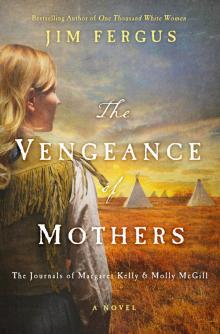 La Vengeance des mères
La Vengeance des mères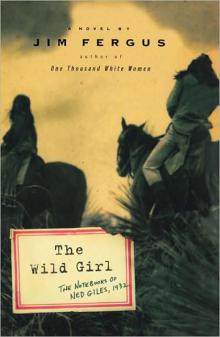 The Wild Girl: The Notebooks of Ned Giles, 1932
The Wild Girl: The Notebooks of Ned Giles, 1932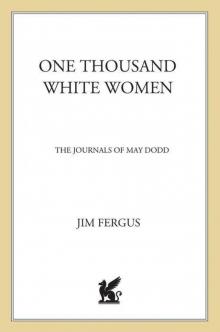 One Thousand White Women
One Thousand White Women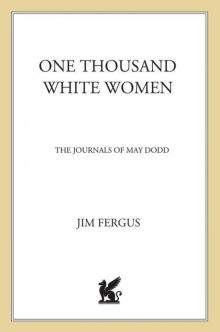 One Thousand White Women: The Journals of May Dodd
One Thousand White Women: The Journals of May Dodd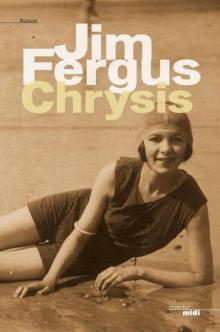 Chrysis
Chrysis Strongheart: The Lost Journals of May Dodd and Molly McGill
Strongheart: The Lost Journals of May Dodd and Molly McGill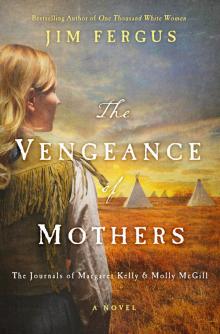 The Vengeance of Mothers
The Vengeance of Mothers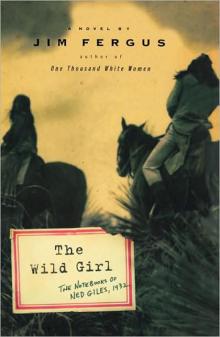 The Wild Girl
The Wild Girl